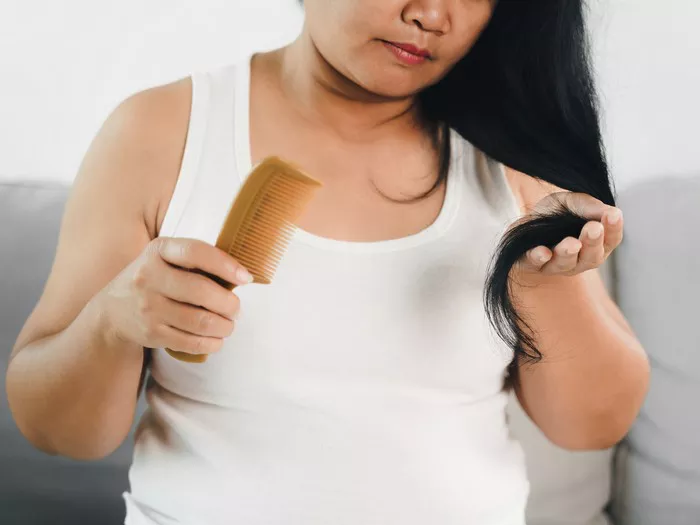Hair loss is a common concern for both men and women, and hormonal imbalances are often cited as a significant contributing factor. When hormonal fluctuations disrupt the natural hair growth cycle, it can lead to thinning, shedding, and even baldness. The prospect of hormonal hair loss can be daunting, but advancements in medical science offer hope for those seeking to reverse this condition. In this article, we delve into the question: Can hormonal hair loss be reversed?
Understanding Hormonal Hair Loss:
Role of Hormones: Hormones play a crucial role in regulating various bodily functions, including hair growth. Androgens, particularly dihydrotestosterone (DHT), are known to affect hair follicles by shrinking them over time. This process, called miniaturization, leads to weaker and thinner hair strands, eventually resulting in hair loss.
Types of Hormonal Hair Loss: Hormonal hair loss can manifest in different forms, such as androgenetic alopecia, which is more common in men, and female pattern hair loss, which affects women. Other conditions like polycystic ovary syndrome (PCOS) and thyroid disorders can also contribute to hormonal imbalances and subsequent hair loss.
Impact on Hair Growth Cycle: Hormonal imbalances disrupt the natural hair growth cycle, leading to a shorter growth phase (anagen), prolonged resting phase (telogen), and accelerated shedding. This imbalance creates an unfavorable environment for healthy hair growth and necessitates intervention to restore equilibrium.
Treatment Options for Hormonal Hair Loss:
Medications: Several medications are available to address hormonal hair loss. Finasteride, for example, inhibits the conversion of testosterone to DHT, thereby reducing its harmful effects on hair follicles. Minoxidil, on the other hand, promotes blood circulation to the scalp and prolongs the growth phase of hair follicles. These medications can help slow down hair loss and stimulate regrowth.
Hormone Therapy: Hormone replacement therapy (HRT) may be recommended for individuals experiencing hormonal imbalances due to menopause or other underlying conditions. By restoring hormone levels to normal ranges, HRT can alleviate hair loss and improve overall well-being. However, it’s essential to weigh the potential risks and benefits of HRT with a healthcare provider.
Nutritional Supplements: Certain vitamins and minerals play vital roles in hair health and can support the regrowth process. Supplements like biotin, vitamin D, iron, and zinc have been shown to promote hair growth and strengthen hair follicles. Incorporating these supplements into a balanced diet can complement other treatment modalities for hormonal hair loss.
Topical Treatments: Topical solutions containing ingredients like minoxidil, ketoconazole, and caffeine can directly target the scalp and hair follicles, promoting circulation and stimulating growth. These treatments are typically applied daily and can be effective in conjunction with other therapies for hormonal hair loss.
Is Reversal Possible?
Early Intervention: Timely intervention is crucial for maximizing the chances of reversing hormonal hair loss. Recognizing the signs of hair thinning and seeking treatment promptly can help prevent further damage to hair follicles and facilitate regrowth.
Combination Therapy: Combining multiple treatment modalities, such as medications, hormone therapy, and lifestyle modifications, can enhance the efficacy of hair loss reversal efforts. A comprehensive approach addresses underlying hormonal imbalances while simultaneously promoting a conducive environment for hair regrowth.
Individual Response: The effectiveness of treatment varies from person to person, depending on factors such as genetics, overall health, and the severity of hormonal imbalances. Some individuals may experience significant regrowth with treatment, while others may see more modest improvements.
Long-Term Management: While hormonal hair loss can be reversed to a certain extent, long-term management is essential to maintain results. Continued use of medications, regular monitoring of hormone levels, and adopting a healthy lifestyle can help sustain hair growth and prevent recurrence of hair loss.
Conclusion:
In conclusion, hormonal hair loss is a complex condition influenced by various factors, including hormonal imbalances, genetics, and lifestyle. While reversing hormonal hair loss entirely may not always be possible, advancements in medical science offer a range of treatment options to mitigate its effects and stimulate regrowth. By addressing underlying hormonal imbalances, incorporating targeted therapies, and adopting a holistic approach to hair care, individuals can optimize their chances of reversing hormonal hair loss and reclaiming a full, healthy mane. Consulting with a healthcare provider is paramount to developing a personalized treatment plan tailored to individual needs and goals. With dedication, patience, and proactive management, the journey to reversing hormonal hair loss can yield promising results and restore confidence in one’s appearance and well-being.

